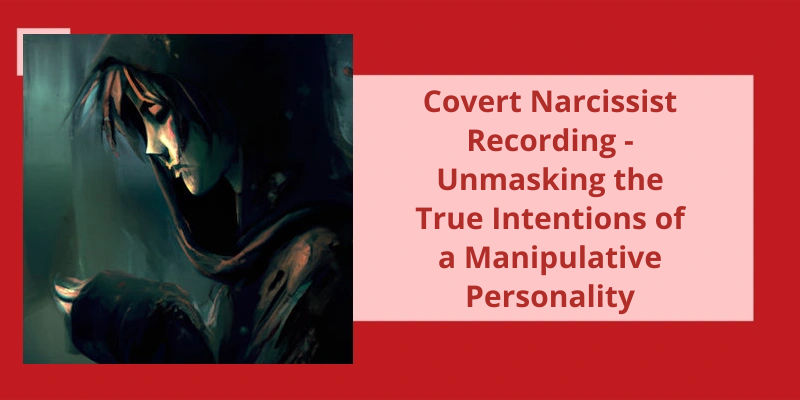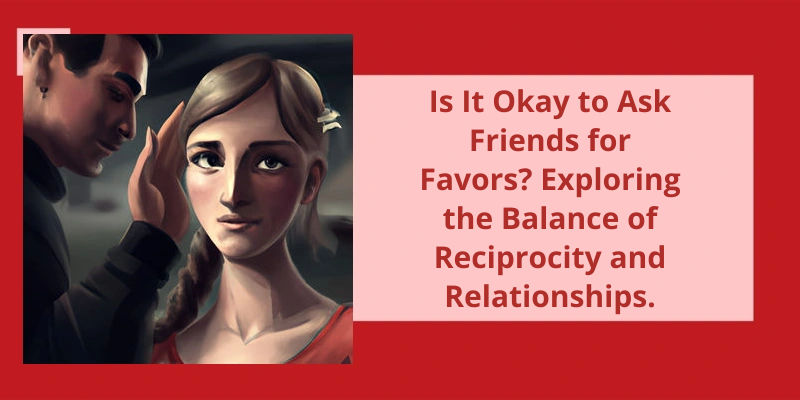It's a well-known fact that narcissism is a pervasive problem in our society. However, while most people are familiar with the overt narcissist, who’s loud and brash about their grandiosity, there are also covert narcissists who’re just as damaging, but much harder to detect. These individuals are experts at masking their narcissistic tendencies behind a façade of humility and selflessness, making it difficult for others to recognize their true nature. One tool covert narcissists may use to further their manipulative agenda is recording.
Do Narcissists Record Your Conversations?
Narcissists have a tendency to be controlling and manipulative, and recording conversations is just another way for them to maintain their hold over their partner. They’ll often use the recordings to try and catch their partner in a lie or to prove that they said something they later deny saying. This can be incredibly damaging to a relationship, as this kind of constant surveillance can make the other person feel as though they’re always being watched and monitored.
Some narcissists simply enjoy the power that comes with having access to this kind of information, and they may use it to further their own interests or to manipulate others in their social circle. In any case, it’s important to be aware that your conversations may be being recorded, and to take steps to protect yourself if you feel as though you’re being targeted.
If you suspect that your conversations are being recorded by a narcissist, there are a few things you can do to protect yourself. First, try to avoid discussing sensitive topics or sharing personal information, especially over the phone or in writing. Instead, try to have these conversations in person or in a private setting where you can be sure that no one else is listening.
Another important strategy is to keep a record of your own conversations and interactions with the narcissist. This can help you to keep track of any lies or manipulation tactics that they may be using, and can provide you with evidence to use if you need to confront them or seek professional help.
Finally, it’s important to remember that you aren’t alone. There are many resources available to help people who’re dealing with narcissistic abuse, including therapists, support groups, and online communities. By reaching out for help and support, you can begin to heal and move forward from this difficult experience.
The Legality of Recording Conversations Without Consent and the Potential Consequences for Narcissists Who Do So
It’s legally questionable to record conversations without consent. Narcissists who do so may face consequences according to the laws of their jurisdiction.
Dealing with a covert narcissist can be tricky, especially if you don’t know how to handle them. It’s important to remember that these individuals can be manipulative and may try to control your thoughts and actions. However, there are effective ways to mess with a covert narcissist and regain your sense of self. In this article, we’ll explore five tactics to help you take back control and protect yourself from their toxic behavior.
How to Mess With a Covert Narcissist?
Firstly, it’s important to understand that covert narcissists are more difficult to identify than their overt counterparts. They’ve a more subtle form of self-centeredness that can go unnoticed for a long time. However, once you’ve identified them, it’s important not to lose sight of yourself. Dont let their manipulations change you or make you lose track of who you are. Remember your values, beliefs, and goals and continue to pursue them.
Secondly, stop allowing them to occupy your thoughts. They’ll constantly talk about their achievements, their opinions, and their needs. Dont let this dominate your thinking and conversations. Instead, create boundaries and limit the time you spend with them. It’s okay to say no or to change the topic of conversation.
Thirdly, stop allowing them to influence you. Covert narcissists often have a way of manipulating people to get what they want. They can use emotional blackmail, guilt-tripping, and other tactics to make you do what they want. To stop this from happening, be aware of their techniques and stand your ground. Say no if you don’t want to do something, be clear about your boundaries, and don’t let them guilt-trip you.
Fourthly, change your focus. Instead of obsessing over the covert narcissist, shift your attention to other areas of your life. Spend time with people who appreciate and respect you. Pursue hobbies and interests that you enjoy. Take care of yourself physically and mentally. This will give you a healthy distraction from the covert narcissist and help boost your self-esteem.
Fifthly, be your own person. It’s important to remember that you’re your own person, with your own dreams and aspirations. Dont let the covert narcissist make you feel small or insignificant. Celebrate your achievements, pursue your dreams, and be confident in who you are.
Source: What’re some ways to mess around with a narcissist …
Understanding the intricacies of a covert narcissist can help in navigating relationships with them. While indifference is painful, it isn’t what hurts them the most. In fact, it’s being confronted with the truth of who they’re that causes the most distress. This is because the covert narcissist has built an idealized image of themselves and seeing anything contradictory to that image threatens their sense of self.
What Hurts a Covert Narcissist the Most?
When someone or something comes along to reveal their true self, it can be devastating to them. They struggle to maintain their facade of perfection, and seeing any cracks in that image can be painful. In this sense, the covert narcissist is their own worst enemy; they create an image of themselves that’s impossible to live up to, and any deviation from that ideal is seen as a failure.
In addition to criticism, rejection can also be incredibly painful for a covert narcissist. They crave attention and validation, and when they don’t get it, they feel worthless. This is particularly true when it comes to romantic relationships. A covert narcissist may put all of their energy into winning someone over, only to feel rejected when that person doesn’t reciprocate their feelings.
Because they see themselves as above most people, they expect others to be loyal to them no matter what. When someone they trusted turns on them or does something they perceive as disloyal, it can be a huge blow to their ego.
Finally, isolation can also be incredibly painful for a covert narcissist. They thrive on attention and admiration, and when they don’t get it, they can feel very alone. This is why many covert narcissists will go to great lengths to maintain a social circle or keep people around them, even if those relationships are toxic or one-sided.
However, by recognizing their weaknesses and working to address them, they can learn to become more resilient and less reliant on external validation.
The Impact of Childhood Trauma on Covert Narcissism
Childhood trauma can have a significant impact on individuals who exhibit covert narcissistic qualities. This is because the trauma can lead to a lack of secure attachments and a need for control and validation, which can manifest as covert narcissistic behaviors and tendencies.
Understanding the motivations of a covert narcissist can be difficult, but it’s important to recognize the signs in order to protect yourself from potential emotional harm. While seeking admiration and emotional unavailability are common traits, there may be more nuanced behaviors at play. Let’s take a closer look at what a covert narcissist may want from you.
What Does a Covert Narcissist Want From You?
Instead, they often expect others to cater to their emotional needs, without reciprocating. Covert narcissists may also manipulate their partners, using guilt and other tactics to maintain control.
Constant validation – A covert narcissist wants constant affirmation of their superiority, and may manipulate situations to ensure they receive it. They may also dismiss any criticism or feedback, and turn conversations back to themselves, making it difficult for others to express their own needs and opinions.
They may also hoard information, in order to retain power and limit their partners options.
How to Identify the Signs of a Covert Narcissist
- They’ve a grandiose sense of self-importance
- They require excessive admiration
- They’ve a sense of entitlement
- They lack empathy
- They exploit others for their own gain
- They often have envy towards others
- They’re arrogant
- They’re prone to rage or anger
- They’ve a tendency to be manipulative
It’s never easy to deal with a narcissist, especially when they’ve been exposed. Narcissists are known to put on a façade that’s difficult to see through, but once their true nature is revealed, the consequences can be dramatic. When the mask comes off, it’s a moment of reckoning, and the narcissist’s true colors are laid bare for all to see. What happens next can be unpredictable, but one thing is for sure; it won’t be pretty.
How Does a Narcissist React When You Unmask Them?
Theyve been exposed for who they really are, and to the narcissist, this is absolutely devastating. The narcissist will typically respond in one of two ways: they’ll either lash out and become extremely defensive, or they’ll retreat into themselves and become sullen and withdrawn. In either case, they’ll be deeply unhappy and will likely begin plotting their revenge.
The narcissist may try to dismiss or discredit the person who’s unmasked them, claiming that they’re lying or that they don’t understand the situation. They may become aggressive or confrontational, trying to intimidate the unmasker into backing down. In some cases, they may even launch a smear campaign against the person, trying to damage their reputation or convince others not to believe them.
On the other hand, the narcissist may withdraw completely, retreating into their own world and refusing to engage with others. They may become depressed or withdrawn, feeling like they’ve lost control of their carefully crafted image. They may also engage in self-destructive behaviors, such as substance abuse or reckless behavior, in an attempt to cope with their feelings of shame and inadequacy.
Ultimately, the unmasking of a narcissist can be a painful and difficult process for all involved. However, it’s also an important step towards healing and growth, both for the individual and for any relationships they may be a part of. By confronting the truth about themselves and their behavior, a narcissist can begin to take responsibility for their actions and work towards a more honest and authentic way of living.
Conclusion
In conclusion, the issue of covert narcissists recording their conversations and interactions with others raises several important questions and concerns regarding privacy, trust, and consent. While it can be tempting to try and uncover the true motivations and intentions of these individuals, it’s important to remember that the act of surreptitiously recording someone without their knowledge or consent is both unethical and potentially illegal. Instead, it’s better to focus on building healthy relationships based on mutual respect, open communication, and a genuine desire to understand and support one another. Only by fostering these types of connections can we hope to create a world that’s truly free from the toxic influence of covert narcissism.






